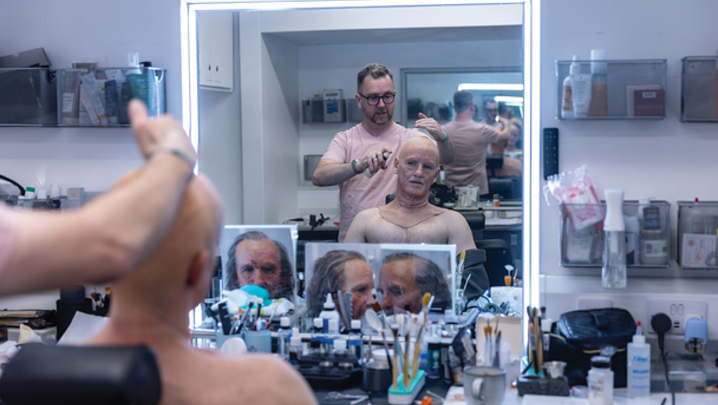Series that hook into viewers’ obsession with their homes are here to stay, says an expert RTS panel
Property shows have long been an essential part of many broadcasters’ schedules. They’re ubiquitous in both daytime and peak time and have made celebrities of presenters such as the seriously posh Kirstie Allsopp and her charming Location, Location, Location co-host, Phil Spencer.
But what is the secret of their success and how do they endure while other factual fare is more ephemeral? Is it our guilty pleasure in seeing beyond other people’s front doors, the relationship between the programme presenters, our obsession with property prices – or something loftier, such as an interest in the rich variety of British architecture?
According to an RTS webinar, it’s probably a mix of all these factors plus something less tangible to do with escapism.
Allsopp, who first co-hosted Location, Location, Location back in 2000, pinpointed the “human stories” that exist at the centre of her show, which aims to find dream homes for house hunters with the minimum of heartache. “We invest so much in where we live and how we live. We use our homes to say something about ourselves. We’re fascinated by people’s stories. There’s an intrinsic nosiness that we all have.”
So what about the R factor? That’s R for her relationship with Phil Spencer – described as “one of the great TV relationships” by her fellow panellist Nick Knowles, the presenter, producer and writer whose credits include BBC One’s DIY SOS.
What did she think? “Someone once said about Phil and I that we’re very different personalities but very similar characters. I am genuinely fond of Phil. We are a unit.… But I do find it strange that people think it’s all about our relationship. I’ve acknowledged that’s true, but I think it’s important that Phil and I don’t think it’s about us.
“If we became too obsessed with that, it would wreck everything. It has to be about your relationship with those people who you’re helping to find a home.”
Extraordinarily, Location, Location, Location is 34 series old and has undergone at least one big revamp. DIY SOS has knocked up 30 series.
Strictly speaking, it’s a different kind of show to Location, Location, Location. As Knowles suggested, the roots of DIY SOS lie in a more innocent, less consumerist age – that of TV’s first Mr Makeover, Barry Bucknell, the BBC’s DIY guru of the 1950s, when make do and mend was for many people a way of life rather than a leisure pursuit.
“It’s part of the human condition that you want to make the space you live in a nicer place to be,” said Knowles. “For the past 20 years or so, we’ve become obsessed with increasing the value of our homes. Our homes have become a commodity. From early cave paintings onwards, people were painting things on their walls to make them a little bit more homely and interesting.
“A show like DIY SOS evolves over time. At the end of each series, the producer and I sit down and think about where it’s going to go next – unlike, say, Changing Rooms, which never really changed.”
Kitty Walshe, Co-Managing Director of Remarkable, the production company responsible for such shows as Your Home Made Perfect, The House That £100k Built and Restoration Home, opined that, for a property show to last, it needed to be “useful” and, of course, entertaining. “Even with DIY SOS, there’s a lot of take-out in that show. You learn about what you may be able to do in your own home,” she said.
Over the years, Channel 4 has become synonymous with shows based on property. Four years ago, it was reckoned that the network broadcast no fewer than 12 programmes built on the P word.
“Often, these shows are more about people than property,” acknowledged Deborah Dunnett, commissioning editor for popular factual at Channel 4. “That’s what keeps them fresh and why every episode doesn’t feel derivative.”
What impact would the pandemic have on this much-loved TV staple? As the UK experienced an economic downturn of unprecedented swiftness, would property shows feel the pinch?
There was consensus that audiences were likely to see more shows encouraging homeowners to improve what they had than programmes helping them to find new homes.
"People are going to try and improve the space in which they live for the purpose of living in it, rather than for profit”
“Perhaps it’s less about how to make money from your property than actually to find a home you want to live in for the long term,” said Walshe. “That is the zeitgeist. ‘I spend all this money on stamp duty, removal costs. You know what, I could just refigure what I’ve got, rather than move.’”
Allsopp said that, during lockdown, many people had changed their relationship with their homes and neighbourhoods: “They’ve discovered attractions on their doorstep that they weren’t previously interested in.”
Knowles agreed that people were rethinking these things. In the past 20 years, UK homes had been seen too much as investments and not enough as places where people wanted to live, he suggested. “My quality of life is about the place I live in now,” he said. “Because of the lockdown, people are thinking more like this than, ‘What is my house worth if I sell it?’”
Property as a commodity was likely to become less important as homeowners became more connected to their homes and local communities.
“People are going to try and improve the space in which they live for the purpose of living in it, rather than for profit,” added Knowles.
“That hangover from the property boom of the 1990s is something we’re moving on from,” agreed Damion Burrows, architect and presenter, whose property show credits include Grand Designs: House of the Year and Your Home Made Perfect.
In the new normal, people would need to think hard about having workspaces at home and dedicated areas for kids. Burrows said: “How can I do more with what I’ve got, with small additions and cleverly reworking the space so that I can enjoy being here more? People are seeing their house in a different light – they’re seeing it [every] afternoon.”
Allsopp made the point that people were realising that they had been expanding their properties and filling them with stuff they didn’t need and that failed to make them happy.
Knowles told the RTS how he had downsized to a small country cottage from a large Georgian house and, as a result, become more content. “You don’t always have to get bigger to be happier,” he said.
Would people’s changing attitudes towards their homes and local areas affect the kind of property shows that Channel 4 commissioned, asked the webinar’s host, Boyd Hilton, entertainment director of Heat magazine.
Dunnett said she thought it would. “During lockdown, a lot of our best programmes have said: ‘We know how you’re feeling at home right now. Let us be useful or transport you somewhere else.’ You really get that connection to your audience that you didn’t have before.”
Allsopp said she was desperate to get back to work, enabling would-be purchasers to find their perfect home. But she conceded that the coronavirus had changed everything: “Do they want now what they wanted before? Have they lost their job, have they changed their job?…
“I’m champing at the bit to get out there in this new market and to get on with our job, which is helping people.”
Report by Steve Clarke. The RTS webinar ‘Why we love… property shows’ was held on 2 June. The producer was Sarah Booth, director of communications at Endemol Shine UK.







